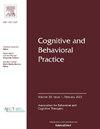Novel Application of Skills for Psychological Recovery as an Early Intervention for Posttraumatic Stress Disorder, Depression, and Alcohol Misuse in Survivors of Recent Sexual Assault: A Case Series
IF 2.9
3区 心理学
Q1 PSYCHOLOGY, CLINICAL
引用次数: 0
Abstract
Skills for Psychological Recovery (SPR) is an evidence-informed, early intervention for teaching survivors coping skills in the aftermath of recent disasters. Although SPR has not been tested following recent sexual assault, there is theoretical support for applying SPR to the needs of recent sexual assault survivors. The current study is the first to describe the application of SPR among survivors of recent sexual assault. SPR was administered by two master-level clinicians over the telephone to five people who experienced a sexual assault in the last month. Clients completed up to five SPR sessions. Mean scores of measures of Posttraumatic Stress Disorder (PTSD; PTSD Primary Care Screen), depression (Patient Health Questionnaire–2), and alcohol misuse (Alcohol Use Disorders Identification Test–Concise) were calculated pre- and post-intervention. Clients reported a reduction in PTSD symptoms (pre-intervention mean = 4.4; post-intervention mean = 2.8), depression (pre-intervention mean = 3.6; post-intervention mean = 2.2), and alcohol misuse (pre-intervention mean = 4.5; post-intervention mean = 3.2) at post-intervention. Results are presented using a case series approach. Findings suggest that SPR may be an effective strategy for reducing early trauma-related symptoms among recent survivors of sexual assault. Future investigations should explore the feasibility, acceptability, and efficacy of delivering SPR with larger, multiculturally diverse samples of recent sexual assault survivors.
心理康复技能在近期性侵幸存者创伤后应激障碍、抑郁和酗酒早期干预中的新应用:一系列案例
心理恢复技能 (SPR) 是一种有实证依据的早期干预方法,用于向幸存者传授应对近期灾难的技能。虽然 SPR 尚未在近期性侵犯后进行测试,但理论上支持将 SPR 应用于满足近期性侵犯幸存者的需求。本研究首次描述了 SPR 在近期性侵犯幸存者中的应用。SPR 由两名硕士水平的临床医生通过电话对五名在上个月经历过性侵犯的人实施。客户最多完成了五次 SPR 治疗。干预前和干预后的创伤后应激障碍(PTSD;PTSD 初级护理筛查)、抑郁(患者健康问卷-2)和酒精滥用(酒精使用障碍识别测试--Concise)测量的平均分进行了计算。客户报告称,干预后创伤后应激障碍症状(干预前平均值=4.4;干预后平均值=2.8)、抑郁(干预前平均值=3.6;干预后平均值=2.2)和酒精滥用(干预前平均值=4.5;干预后平均值=3.2)均有所减轻。研究结果以案例系列的方式呈现。研究结果表明,SPR 可能是减少近期性侵犯幸存者早期创伤相关症状的有效策略。未来的调查应探索在更大规模、多元文化的近期性侵犯幸存者样本中实施 SPR 的可行性、可接受性和有效性。
本文章由计算机程序翻译,如有差异,请以英文原文为准。
求助全文
约1分钟内获得全文
求助全文
来源期刊

Cognitive and Behavioral Practice
PSYCHOLOGY, CLINICAL-
CiteScore
4.80
自引率
3.40%
发文量
118
审稿时长
84 days
期刊介绍:
Cognitive and Behavioral Practice is a quarterly international journal that serves an enduring resource for empirically informed methods of clinical practice. Its mission is to bridge the gap between published research and the actual clinical practice of cognitive behavior therapy. Cognitive and Behavioral Practice publishes clinically rich accounts of innovative assessment and diagnostic and therapeutic procedures that are clearly grounded in empirical research. A focus on application and implementation of procedures is maintained.
 求助内容:
求助内容: 应助结果提醒方式:
应助结果提醒方式:


